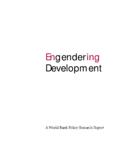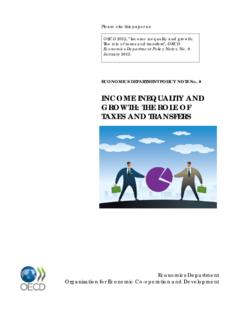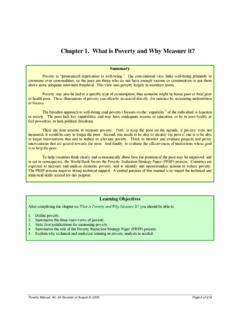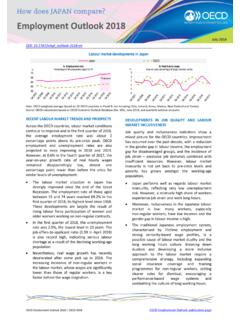Transcription of Dev Econ Syllabus Spring 2015 - mar 29
1 1 The New School Graduate Program in International Affairs Syllabus (rev March 29, 2015) Development Economics Spring 2015 Class: Thursdays 6 7:50pm, Room 713, 72 Fifth Ave Lab: Mondays 8 9:50pm, Room 701, 66 West 12th Street Instructor: Sakiko Fukuda-Parr Office: 713, 7th floor, 72 Fifth Ave E-mail: Office hours: Tuesdays 5:30 PM; Thursdays 4 5:30 PM (sign up for slots on this link or other times by appointment Graduate assistant: Ingrid Harvold Kvangraven Office: 1111, 11th floor, 6 East 16th Street Email: Office Hours: Monday 6 8:00 PM; or by appointment Course Description: This course is an introduction to Development Economics and is concerned with how economists have sought to explain how the process of economic growth occurs, and how or whether that delivers improved well-being of people.)
2 The course includes theories of growth and their critiques from feminist, capabilities and heterodox economic traditions. We explore the relationship between economic growth, poverty, inequality , sustainability and human development. Throughout the semester, we ask: Is equitable growth possible where economic growth is robust and sustained, while expanding human choices and freedoms for all and not just a few, and where the most deprived are empowered? In seeking to answer this question, we examine the theoretical concepts, policy strategies, and empirical evidence from experience. The learning objectives of the course are for students to become familiar with the basic theories and concepts on economic growth and its consequences for distribution, poverty and human development. This course is the required foundation course for the Development Concentration in GPIA.
3 It is designed to complement Theories, Histories and Practices of Development (THPD). Both aim at understanding the contemporary challenges of growth, inequality and human development. But while THPD focuses on contemporary issues and country experiences, this course is about the economic theories that help explain them. Prerequisites: 2 Economics in International Affairs I or equivalent, and THPD unless it is taken concurrently with this course. Required Work: Assignments include two homework question sets, a midterm exam and a final exam. The grading will be structured as follows: - Class participation (10% of final grade) - Two homework assignments (20% of final grade - 10% each) - Mid term exam (30% of final grade) - Final exam (40% of final grade) Participation will be an important part of learning in this course.
4 Students are expected to attend all classes, come prepared, and contribute to class discussion. One absence will be allowed without penalty to the grade. Absences can be made up with two paragraph write ups of each of the required readings, incorporating one paragraph abstract and one paragraph commentary on the article. Students are expected to contribute proactively to class discussion by raising questions, making comments, and offering short presentations. Contribution to discussion will be part of the participation grade. Short presentations will be on topics that emerge in discussions. Students are encouraged to volunteer to make short presentations (5 minutes focusing on a narrow topic to be assigned.). The labs are arranged with two objectives: to cover supplementary material and to clarify concepts already covered in the lecture.
5 Those that cover supplementary material are indicated in the Syllabus as mandatory. Students come to this course with diverse backgrounds in economics and the labs will help clarify any basic concepts that may not be fully explained in the lecture. Lab sessions will be designed to allow flexibility in the material to be covered dependent on student demand. Books and readings: Required for purchase: The following book will be the basic textbook for this course: Ray, Debraj, Development Economics, Princeton University Press, Princeton. 1998; Oxford University Press, New Delhi (Referred to as Ray here) The book is available from Shakespeare and Co. at 716 Broadway (at Washington Pl), and also available online. A good source for purchasing books that provide information on comparative prices and availability are for new books and for used books.
6 The Ray book is available for rent from Barnes and Noble, and from Amazon. Other useful books to have but not required for purchase: Todaro, M. & Smith, S., 2008. Economic Development (10th Edition). Addison-Wesley. A more basic explanation of concepts than Ray. 3 Sen, Amartya (1992) inequality Reexamined Cambridge MA: Harvard University Press. This book is foundational to Sen s ideas about Development as Freedom. Chang, Ha-Joon, (2003) Rethinking Development Economics. London: Anthem Press. Other than chapters from Ray, the required readings will be posted on Canvas. The supplementary readings are listed as additional resources for students who want to pursue some questions further. Course communications: The course webpage on Canvas will include all information including the Syllabus , readings, announcements, assignments, exams, and personal profiles.
7 Individual communications to students will be made through the New School email account. Please make sure to check your New School email account regularly. Academic honesty: Plagiarism is the use of another person s words or ideas in any academic work without proper acknowledgment. The standards of academic honesty and citation of sources apply to all forms of academic work (examinations, essay theses, dissertations, computer work, art and design work, oral presentations, and other projects). It is the responsibility of students to learn the procedures specific to their discipline for correctly and appropriately differentiating their work from that of others. For further information on proper acknowledgment and plagiarism, including proper expectations for paraphrasing source material and proper forms of citation in research and writing, students should consult the MLA Style Manual and Guide to Scholarly Publishing (second edition), chapter 6, on documentation.
8 The New School University Writing Center also provides useful online resources to help students understand and avoid plagiarism, at Course outline Class 1 (Thursday 1/29) Overview of the course *Note no lab on Monday Introductions; course objectives, themes, expectations, organization. Short Lecture: history of mainstream and heterodox thinking about growth, poverty, inequality and human development Required readings: UNDP (1996) Human Development Report 1996, Overview and chapter 2 Growth as a means for Human Development Chang, Ha-Joon (2004) Introduction in Chang, Ha-Joon, (2003) Rethinking Development Economics. London: Anthem Press. Toye, John (2004). Changing Perspectives in Development Economics in Chang, Ha-Joon, (2003) Rethinking Development Economics. London: Anthem Press. Ortiz, Isabel and Mathew Cummins (2012) Global inequality : Beyond the Bottom Billion, A Rapid Review of Income Distribution in 141 Countries.
9 UNICEF Economic and Social 4 Policy Working Paper (focus on empirical results) 2/2 - Optional lab on data sources and Excel Class 2 (2/5) Economic Growth Models Harrod-Domar and Solow models, long-term growth trends. Required readings: Chapter 3 in Ray A. P. Thirlwall (2013). Chapter 2 Growth Theory: Old and New" in Economic Growth In An Open Developing Economy - The Role of Structure and Demand Case studies on Korea, Brazil Rodrik, Dani (2007). One Economics, Many Recipes chapter 1, Fifty Years of Growth (and lack thereof): an interpretation Additional resources: Weisbrot, Mark, and Rebecca Ray (2011). The Scorecard on Development: 1960-2010 Closing the Gap? Working Paper 106. United Nations Department of Economics and Social Affairs. 2006. Todaro, M. & Smith, S., 2008. Economic Development (10th Edition).
10 Addison-Wesley. Chapter 3 relevant sections simpler explanations. Chapter 2 in Ray Lab (2/9) Growth models [Homework 1 assigned] 2/12 no class 2/16 no lab, President s day Class 3 (2/19) - New Growth Theory Human capital, technology, social reproduction, and institutions. Required readings: Chapter 4 in Ray (New Growth Theory) UNDP 1996 chapter 2 section New growth theories A. P. Thirlwall (2013). Chapter 3 A Critique of Orthodox Growth Theory: Structure and Demand Matter for Economic Growth in Economic Growth In An Open Developing Economy - The Role of Structure and Demand Folbre, Nancy (2006) Measuring Care: Gender, Empowerment, and the Care Economy Journal of Human Development, 7:2 183-99 Additional resources: 5 Ruttan, Vernon (1998) The New Growth Theory and Development Economics: A Survey.







